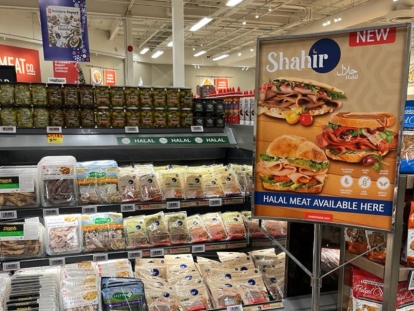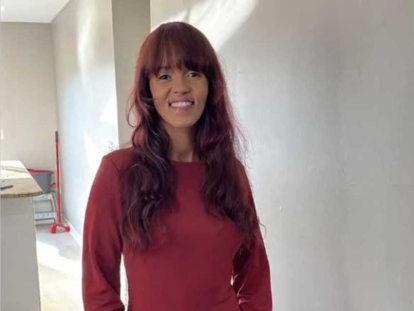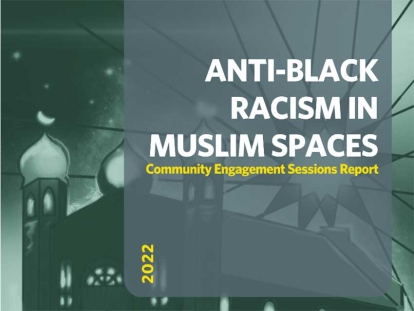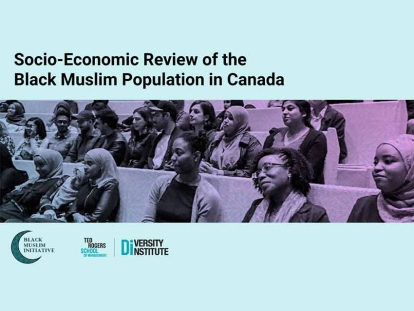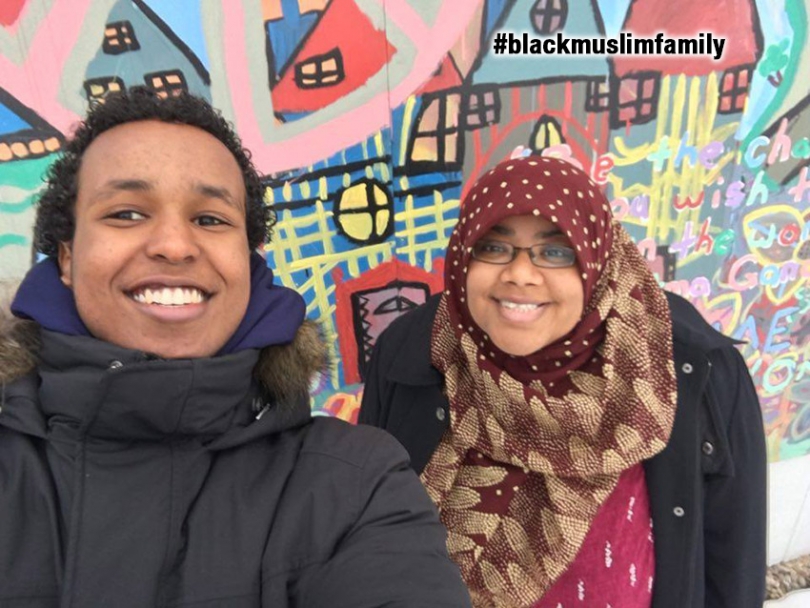 Khalid Egeh and Chelby Daigle take a Selfie as part of the #BlackMuslimFamily Twitter Campaign launched by American Muslim Kameelah Rashad in the wake of the RIS Controversy.
Khaled Egeh
Khalid Egeh and Chelby Daigle take a Selfie as part of the #BlackMuslimFamily Twitter Campaign launched by American Muslim Kameelah Rashad in the wake of the RIS Controversy.
Khaled Egeh
Jan
In the fallout of the RIS Controversy, I shared a Facebook post about How to be an Ally to Black Muslims. It has been shared widely in Canada and the US. I have been asked to make it more easily accessible, so I'm publishing it here on Muslim Link.
I am offering this advice as someone who works in the field of anti-racism and diversity, equity & inclusion, who spearheaded Ottawa's first “Addressing Anti-Black Racism” Forum last August and helped to organize subsequent consultations with provincial government officials on the issue of anti-Black racism in Ontario.
But most importantly, I am offering this advice as someone who is grateful to have the opportunity to be accepted as an ally by individuals in other marginalized communities, both Muslim and non-Muslim, and without this experience, I wouldn’t be in a position to talk about being an ally. Being an ally is great for spiritual growth-particularly around cultivating humility and overcoming arrogance. Again, I am grateful to Allah that people allow me to be their ally.
I reverted to Islam almost 15 years ago alhamduillah (Thanks to Allah) and the biggest challenge I have faced over that time wasn’t wearing hijab, or learning to pray, or even coping with Islamophobia-as I was already experiencing discrimination based on my gender, race, class, and mental illness, I had already built up some resilience around this.
No, the biggest challenge I have faced and continue to face is navigating anti-Black racist bias within Muslim communities-particularly when it comes from otherwise kind, friendly, highly educated Muslims who see themselves as open-minded or even progressive-but whose response when Black Muslims challenge their statements, writings, events, or organizational culture as exclusionary or alienating of Black Muslims is to get angry, defensive, launch personal attacks and sometimes just be plain mean. And, I will probably receive similar backlash to this article.
Alhamduillah, this experience has definitely made me better at working in the field of diversity, equity & inclusion, so has been beneficial on a professional level, but on a personal level it is disappointing, exhausting, and hurtful and leaves me feeling overwhelmed by the reality that there are few safe harbours for me and other Black Muslims, particularly as we seek refuge from rising Islamophobia and anti-Black racism.
Spiritually though, I know it is a gift and test of patience (sabr) from Allah and the answer is only in striving to make change within the Ummah (Global Muslim community) particularly when I most feel like running away.
So my advice to Non-Black Muslims who want to be allies to Black Muslims comes from this spiritual, personal, and professional place.
1. You can’t declare yourself to be an ally to Black Muslims. We choose you.
Being an ally to Black Muslims means stepping back, learning from, and listening to Black Muslims. It does not mean talking about, writing about, or donating money to Black Muslims before you even connected with any Black Muslims to ask them if they thought that was a good idea.
TIP: If you are a great speaker, a great writer and/or have access to funds Mash’Allah (praise Allah), take your skills and resources and ask to partner with Black Muslim community organizers and work on something together. If they agree to work with you—great.
2. Unlearn your own prejudices—Don’t prioritize your time pointing out other people’s.
Being an ally is all about building real-time, not just virtual, relationships with members of the community you want to be allied with. It also means that you realize that in the process of working together, Black Muslims will point out a lot of the blind spots you have and the ideas and ways of organizing that you may be used to but that are actually excluding and alienating Black Muslims and probably a lot of other Muslims too. You have to want to learn about those things to really be an ally. If you are not open to having to unlearn your own prejudices, there is no point in stating you are an ally because, you aren’t.
Being an ally is an exercise in humility as we have to confront our own prejudices, the negative impact they have on others and the arrogance and defensiveness that comes when we have to accept that we are wrong about some things.
Also, you need to understand your own personal context for doing this work. If you are Lebanese, the history of anti-Black racism within your community you need to explore is very different than if you are Sudanese or Tunisian. If you are South Asian, again, prejudices about Black peoples you may need to unlearn may be different if your family has been living for generations in Kenya, South Africa, or Guyana than if they have always been based in India or Pakistan. If you are a White revert to Islam, you may need to explore how your conversion to Islam, while making you a target of Islamophobia, doesn't eliminate your White Privilege. So you need to take a good look in the mirror and dig deep into your own histories to do this work.
TIP: If you think being an ally to Black Muslims is about point fingers at other people you really aren’t ready to take on this work. It is about you unlearning your prejudices and the ways that you consciously or unconsciously exclude and alienate Black Muslims. You can’t tell other people how to stop doing this if you haven’t worked on how to stop doing it yourself.
3. Expand your networks of Black Muslims.
So first and foremost, get to know the Black Muslims around you. Attend their events-don’t just invite them to yours.
I recently attended an event on Parliament Hill about countering Islamophobia and there were hardly any Black people there because the invite had been limited to the board and staff of Muslim organizations—which meant that some of the people doing the best work on this issue didn't get an invite. Sadly, I have had this experience on multiple occaisons at meetings, consultations, and even conferences organized by Muslim communities. I am sometimes the only Black person in attendance just because I am the Editor in Chief of Muslim Link.
Many of our brightest Black Muslims are very active within the mainstream because sadly it is often a lot more inclusive across both racial and socio-economic (another serious division in Canadian Muslim communities) lines. Reach out to them and figure out what their priorities are, learn from them, particularly how you can make Muslim spaces more relevant to them and their peers.
TIP: Start looking at the leadership and staffing of Muslim organizations you are involved with and start having good hard discussions on why they are not that reflective of the ethno-cultural diversity of Canada's Muslim community.
4. Promote the work and voices of Black Muslims, not what you are doing for Black Muslims.
Black Muslims in the US and Canada are doing great work for the Ummah (Global Muslim community) and for society at large. Sadly, we seldom see them celebrated by Muslim media or Muslim community organizations, particularly in Canada. They are far more often acknowledged in mainstream media and non-Muslim community organizations. This is an example of how anti-Black racism manifests itself within Muslim communities. It is as if there is this huge blind spot when it comes to seeing the achievements of Black Muslims.
What are you doing to celebrate the accomplishments and contributions of Black Muslims in your community? This should be a priority question you should ask yourself as a potential ally.
Black Muslims have expertise in a variety of subject matter areas from Islamic Studies to Journalism. Do you invite them as subject matter experts and speakers to your events on these subjects?
Our true allies celebrate with us. I have had a lot of conversations about toxic allies with my Black and Indigenous friends. Toxic allies are people who have something of a saviour complex, like to speak on our behalf instead of creating opportunities for Black and Indigenous folks to speak, and who often want to focus on our tragedies but are nowhere to be seen when we are showcasing our triumphs. Because we are actually doing pretty good under the circumstances, Alhamduillah (Thanks to God). So, look for opportunities to celebrate with Black communities so that your work as an ally doesn't just perpetuate negative stereotypes of Black people as perpetually pathological and downtrodden because we aren't.
TIP: Before you organize an event just focusing on anti-Black racism in your Muslim community, why not just organize a series of events on any other subject but make the effort to find a qualified Black Muslim subject matter expert to be a speaker on the subject?
5. Black Muslims need their own spaces to heal and organize
Sometimes, as Black Muslims we are going to need to organize on our own, we won't invite you to everything, and we can't deal with accusations of exclusion from you. We don't have many spaces to reflect on the particular difficulties of facing both Islamophobia and anti-Black racism on a regular basis, pretty much everywhere we go, so don't get angry if we start claiming more space for our own organizing and healing on these issues.
TIP: As an ally, you can offer free space for gatherings like this.
6. Please talk to your own communities about anti-Black racism.
Don't do all this work with Black Muslims but when you go back into your own communities or with your friends and families you say nothing in the face of ignorance and prejudice. You have a responsibility to share what you have learned and unlearned with those around you.
But be humble about it. The more work you actually do as an ally to Black Muslims, the more you should realize just how ignorant you still are. So don’t debate members of your community to show off how much more you know than them. That’s not humility, that’s arrogance. Talk to them to help them learn/unlearn and to reduce the harm they may be consciously and/or unconsciously doing to others.
TIP: As stated before, being an ally is an act of humility, so when engaging with members of your community who hold prejudices against Black Muslims or who are consciously or unconsciously excluding or alienating Black Muslims, share your own personal journey of unlearning your prejudices. You can’t teach something if you never learned it yourself and if you can share your own mistakes people are less likely to get defensive when confronted with their own prejudices.
7. You need to start engaging with Black non-Muslims too.
One of the most disturbing issues I have faced in the Muslim community since reverting over a decade ago is how anti-Black racism by Muslims particularly targets non-Muslim Black people. The history of anti-Blackness goes way back in the Muslim world—to this day there are marginalized Black communities of descendants of slaves in India and Pakistan; not to mention how Black migrants are treated in the Middle East or North Africa or how "abd" is a racial slur I can hear in Ottawa and has become so common in Michigan they had to launch a "Drop the A Word" Campaign.
These are all realities that many non-Muslim Black peoples, particularly from the Horn of Africa, East Africa, and countries like South Sudan or Chad or Nigeria are well aware of. Canada and the US are multicultural countries with people from these communities as our fellow citizens so they also need to be included as part of this conversation.
TIP: Black communities may actually have more effective interfaith dialogue strategies that you as a Muslim can learn from. This is particularly true for African American communities where both Muslims and Christians often share the same cultural backgrounds or are even members of the same family.
This is also true for immigrants and refugees from Eritrea, Ethiopia, and many West and East African countries. In Ottawa, I have attended vigils for the victims of Daesh or Al-Shabab led attacks in Libya and Kenya where Christians were separated from Muslims and murdered. Muslim speakers were always included in these vigils by the organizers not because of something they learned in “multicultural” Canada but because reconciliation and bridge-building is part of their cultural traditions and they already had personal connections with Muslims because that’s just how people live their lives in many Sub-Saharan African countries.
Again, you need to start seeing Black Muslim communities as assets to the wider Muslim community—you are not doing Black Muslims a favour by being an ally—you are doing yourself a favour by benefiting from the knowledge and networks you didn’t even know existed before.
8. Beyond Black Lives Matter
With all due respect to Black Lives Matter, Black people have been organizing on anti-Black racism in Canada forever. The first time "anti-Black racism" was specifically named as a crisis in Ontario was 1992 in Stephen Lewis' report to then Premier Bob Rae. It is ridiculous how Black people's grievances then are pretty much exactly the same almost 25 years later. None of this is new, you just maybe didn't notice before because it wasn't trending on social media.
Our struggles can't be a fad that you take on and then drop because it is no longer fashionable. If you are an ally your engagement has to be long term, whether we are "trending" or not.
TIP: Learn about and connect with other Black social justice organizations—like the African Canadian Legal Clinic, and thought leaders in your city.
9. Ageism and sexism are also barriers to engaging with Black Muslim communities.
Black Musims are a young community and a lot of our leaders are women. Also, although the majority of Black Muslims in Canada are Sunni, some are Twelver Shia and Ahmadiyya. You may even know some of these people but don't realize it as it isn't always safe for them to identify their sect in these troubled times. So this is another aspect of inclusion that needs to be explored.
TIP: Assess the age and gender of those whom you mainly organize with in the Muslim Canadian community. If it is mostly men over the age of 35 or women over the age of 40 you have already unconsciously excluded the majority of Black Muslim community organizers—and frankly probably a lot of great organizers from your own community. Addressing anti-Black racism will inevitably mean having to take a good hard look at other barriers to inclusion within Muslim communities.
10. Not all Black people agree with each other. And that’s just fine.
Do all Muslims agree with each other? No, so Black Muslims get to be complex and complicated too and it is not helpful to hear so-called allies complain about how Black Muslims are not unified. It is an expectation that comes from an outsider perspective because having to connect with ever larger and more diverse groups of an "Other" community seems overwhelming to some people while for some of us it just seems inevitable and actually exciting. Yay new people—new perspectives!
TIP: Make sure you are engaging with a diversity of Black Muslims in terms of ethno-cultural background. This is particularly important in the Canadian context, where Black Muslim consciousness is just growing and collaborations between Black Muslims from different ethno-cultural groups are still pretty new.
11. Beyond Black History Month.
Please don't focus on having a bunch of events about Black Muslims in February! We are Black 365 days of the year folks. Celebrate that with us all year long.
TIP: Re-Read Point 4
This article was produced exclusively for Muslim Link and should not be copied without prior permission from the site. For permission, please write to info@muslimlink.ca.

